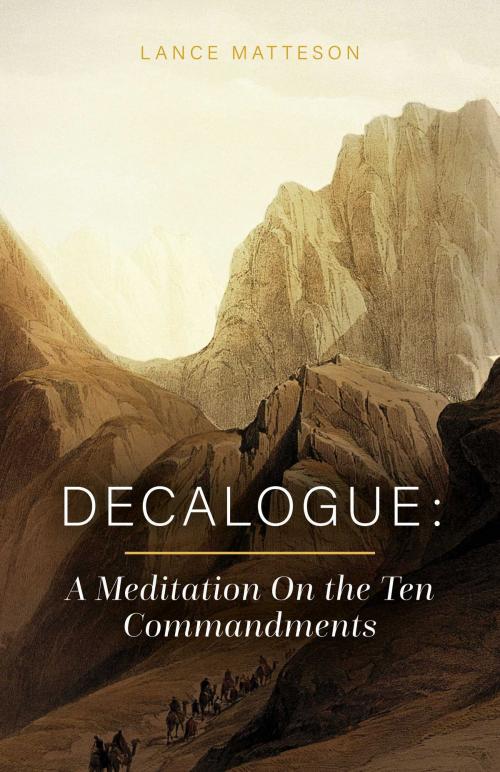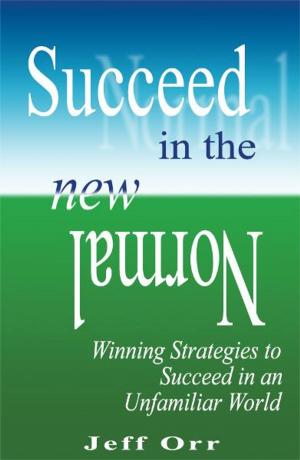Decalogue: A Meditation On the Ten Commandments
Nonfiction, Religion & Spirituality, Bible & Bible Studies, Meditations| Author: | Lance Matteson | ISBN: | 9781543935035 |
| Publisher: | BookBaby | Publication: | May 31, 2018 |
| Imprint: | BookBaby | Language: | English |
| Author: | Lance Matteson |
| ISBN: | 9781543935035 |
| Publisher: | BookBaby |
| Publication: | May 31, 2018 |
| Imprint: | BookBaby |
| Language: | English |
"Decalogue: A Meditation on the Ten Commandments" is true to its title. It is a reflections on the ten-pillar Mosaic code. For three millennia, the Ten Commandments have had a profound influence as a central moral framework for human society. "Decalogue" plumbs afresh this moral influence, while also arguing for the code's metaphysical and remedial importance. The book is neither academic nor sectarian. It is a meditation. Readers must look elsewhere for purely historic, archaeological, linguistic, theological, or denominational treatment of the subject. Instead, author Lance Matteson speaks from a reverent, biblical standpoint influenced by his background as a student of Christian Science, founded in the late nineteenth century by Mary Baker Eddy. The author also utilizes his training as a lawyer - bringing out nuances about such pivotal elements as justice, consistency, and accountability. The author gained insight too from his nine years working in the Holy Land, doing projects with the Palestinians that required ongoing negotiations with Israeli Jews and Arab Muslims and Christians – that is, with the monotheistic heirs of Abraham and Moses in the very region trod by these grand figures. The book's structure is simple. After an introduction, a single chapter is devoted in turn to each of the Ten Commandments, with a closing chapter that looks comprehensively at the Decalogue as a whole. The discussion is straightforward, yet at times dense. Each Commandment is analyzed thoroughly. The sequential logic and connection of each command with the next is indicated. The burden of the "Decalogue" moral thesis is that all ten laws in this code have much to teach every one of us about doing right by ourselves and others. The argument is that, properly and plausibly understood, these classic standards are wise not arbitrary, principled not random, universal not cultural, grounded not impractical, humane not repressive, progressive not regressive. Matteson's ontological argument is that the Ten Commandments are not only a moral platform; they are also a metaphysical statement, a credo of spiritual identity embraced in an understanding of God's character and infinite oneness – the essence of the primary First Commandment. The argument is that this spiritual sense of God indicated in the commandments necessarily elevates the sense of our own identity as the divine offspring or image. Matteson argues that this spiritual sense of being is what gives these commands their moral force – and protects them from fanatic perversion. Far from being merely an abstract theory, Matteson posits that progressively grasping – and abiding by – this inspired, profound spiritual-moral framework will drive progress and healing in perfectly practical ways. Individuals find healing. Society improves. The hope of redemption becomes real. Matteson mostly sidesteps interpretations of the Commandments relating to particular contemporary controversies – leaving those mostly to the judgment of the individual reader. However, the book's wrestlings are as obviously timely today as their subject matter is timeless. One has only to consider such headline "Decalogue" topics as aggression, infidelity, dispossession, lies, and acquisitive materialism - and their opposing core social values. But the overall attitude of the book is "big picture": generic, reflective, rational. How can we place these simple historic laws in perspective? How do they interrelate? What is their rationale, their underlying logic? What is their importance to society and individuals? Why do they matter? Matteson offers his own frank views on these and related questions. He challenges the reader to think, to look beyond the surface, while essaying to be true to the texts. The author is upfront about his reverence for Scripture, while respecting nonbelievers. But those who feel these axiomatic norms are quaint and obsolete should be prepared for a spirited counterargument.
"Decalogue: A Meditation on the Ten Commandments" is true to its title. It is a reflections on the ten-pillar Mosaic code. For three millennia, the Ten Commandments have had a profound influence as a central moral framework for human society. "Decalogue" plumbs afresh this moral influence, while also arguing for the code's metaphysical and remedial importance. The book is neither academic nor sectarian. It is a meditation. Readers must look elsewhere for purely historic, archaeological, linguistic, theological, or denominational treatment of the subject. Instead, author Lance Matteson speaks from a reverent, biblical standpoint influenced by his background as a student of Christian Science, founded in the late nineteenth century by Mary Baker Eddy. The author also utilizes his training as a lawyer - bringing out nuances about such pivotal elements as justice, consistency, and accountability. The author gained insight too from his nine years working in the Holy Land, doing projects with the Palestinians that required ongoing negotiations with Israeli Jews and Arab Muslims and Christians – that is, with the monotheistic heirs of Abraham and Moses in the very region trod by these grand figures. The book's structure is simple. After an introduction, a single chapter is devoted in turn to each of the Ten Commandments, with a closing chapter that looks comprehensively at the Decalogue as a whole. The discussion is straightforward, yet at times dense. Each Commandment is analyzed thoroughly. The sequential logic and connection of each command with the next is indicated. The burden of the "Decalogue" moral thesis is that all ten laws in this code have much to teach every one of us about doing right by ourselves and others. The argument is that, properly and plausibly understood, these classic standards are wise not arbitrary, principled not random, universal not cultural, grounded not impractical, humane not repressive, progressive not regressive. Matteson's ontological argument is that the Ten Commandments are not only a moral platform; they are also a metaphysical statement, a credo of spiritual identity embraced in an understanding of God's character and infinite oneness – the essence of the primary First Commandment. The argument is that this spiritual sense of God indicated in the commandments necessarily elevates the sense of our own identity as the divine offspring or image. Matteson argues that this spiritual sense of being is what gives these commands their moral force – and protects them from fanatic perversion. Far from being merely an abstract theory, Matteson posits that progressively grasping – and abiding by – this inspired, profound spiritual-moral framework will drive progress and healing in perfectly practical ways. Individuals find healing. Society improves. The hope of redemption becomes real. Matteson mostly sidesteps interpretations of the Commandments relating to particular contemporary controversies – leaving those mostly to the judgment of the individual reader. However, the book's wrestlings are as obviously timely today as their subject matter is timeless. One has only to consider such headline "Decalogue" topics as aggression, infidelity, dispossession, lies, and acquisitive materialism - and their opposing core social values. But the overall attitude of the book is "big picture": generic, reflective, rational. How can we place these simple historic laws in perspective? How do they interrelate? What is their rationale, their underlying logic? What is their importance to society and individuals? Why do they matter? Matteson offers his own frank views on these and related questions. He challenges the reader to think, to look beyond the surface, while essaying to be true to the texts. The author is upfront about his reverence for Scripture, while respecting nonbelievers. But those who feel these axiomatic norms are quaint and obsolete should be prepared for a spirited counterargument.















